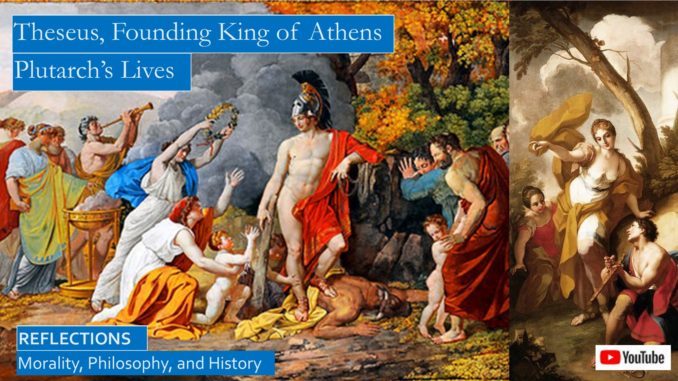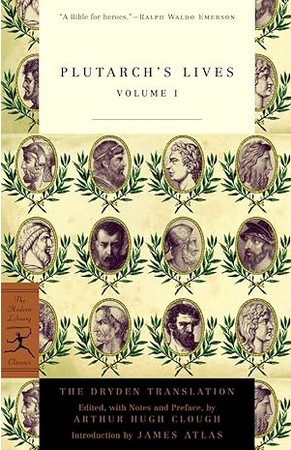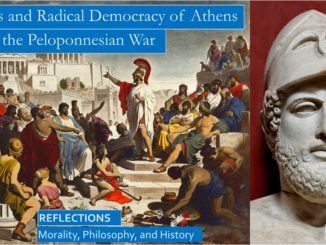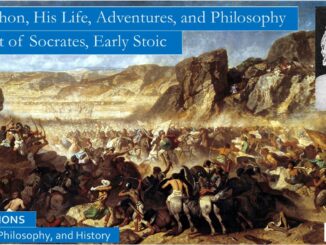
Theseus and Romulus both built mighty cities, Athens and Rome, both are warriors sprung from the gods, “both stand charged with the rape of women, neither could avoid domestic misfortunes nor jealousy at home.”
Youtube video for this blog: https://youtu.be/jOgNKSf9IT4
YouTube script with book links: https://www.slideshare.net/BruceStrom1/mighty-deeds-of-theseus-first-king-of-athens-in-plutarchs-lives
Plutarch passes down us what he finds, and he found mostly stories of our hero Theseus performing mighty deeds. So, the story goes, like father like son, his father, King Aegeus was travelling in the Peloponnese, where Sparta would later flourish, and he is given the daughter of his grandfather, Aethra, to lay with. King Aegeus, knowing that Aethra was pregnant, left for his future son Theseus “a sword and a pair of sandals, hiding them under a great stone that had a hollow in it exactly fitting the tokens; and went away,” sharing this secret only with Aethra, commanding her, if she bore a son, when he became a man, that if he succeeding in lifting the stone, “she should send him away to Athens with the sword and sandals in secrecy, concealing his identity.”
Theseus has superhuman strength, though he is not a demigod like Hercules. Once he matures, his mother reveals his royal birth and tells him about the mighty stone. Once he matures, Theseus lifts the mighty stone like it was a mere rock, and he decides to travel to Athens to claim his birthright. Rather than sail safely to Athens, he decided to rather take the dangerous land route, so he could better the bandits and wild beasts he encountered on his journey. One bandit he encountered was Sinnis, Bender of Pines, and he was slain with his favorite method of slaying, by bending trees, tying Sinnis to the trees, then splitting him apart. Theseus then sought out his terrified daughter, Perigune, and this is how Plutarch describes the courtship:
“But Theseus calling upon her and giving her his promise that he would use her with respect, and offer her no injury, she came forth, and in due time bore him a son, named Melanippus.”
Our hero Theseus kindly raped her gently, but he soon departed, seeking new adventures, as heroes are apt to do. He pushes off a cliff a bandit who pushes people off cliffs, and he resizes another bandit who cuts off people’s feet so they fit in his bed.
And, of course, he has a total of seven trials to overcome on his hero’s journey to Athens. After slaying more bandits and wild beasts, Theseus arrives at Athens where his long-lost father recognizes him from his sword and sandals. They owed Minos, the King of Crete, every nine years a ransom of seven young men and seven virgins to be fed to the Minotaur, a ferocious half-man, half-bull beast, a half man with the head of a bull, who lived in the maze below the palace. The young men and virgins of Athens drew lots, but Theseus volunteered without drawing a lot, and all Athens “were struck with admiration for the nobleness and with love for the goodness of the act.”
Plutarch does not tell us how the daughter of the King of Crete falls in love with Theseus, evidently princesses just cannot resist this hunk of a hero, and Theseus, having arrived at Crete, “having a thread given him by Ariadne, who had fallen in love with him, and being instructed by her how to use it so as to conduct himself through the windings of the labyrinth, he escaped out of it and slew the Minotaur, and sailed back, taking along with him Ariadne and the young Athenian captives.”
Ariadne betrayed her father, King Minos, and Plutarch tells various versions of the story of how Ariadne fared on the voyage to Athens. Plutarch says in some versions of the story, he simple abandons Ariadne for another princess sometime later, in another version, on the way to Attica, his ship is driven to Naxos on Cyprus, and since Ariadne, big with child and sick from the rolling of the ship, is let down on land. But quickly a violent wind launches the ship back out to sea. But never fear, Ariadne falls in love with the god Dionysus, aka Bacchus. Theseus forgets to change the black sail to a white sail, the signal for success, when he sails into Athens. His father, King Aegeus, thinking his son has perished, jumps off a cliff into the sea, which now takes on the name, the Aegean Sea.
Was Theseus only a hero and a playboy? Those are most of the stories passed down to Plutarch, but he does say that after the death of his father, Theseus is crowned King of Attica, and that “he dissolved all the distinct state-houses, council halls, and magistracies, and built one common state-house and council hall,” “and gave the name of Athens to the whole state, ordaining a common feast and sacrifice,” and setting up a commonwealth.
From the beginning Athens welcomed strangers, a custom started by Theseus, inviting them to “enjoy equal privileges with the natives,” proclaiming, “Come hither, all ye people.” Theseus was the first to divide the Commonwealth into three distinct ranks, noblemen, husbandmen, and artificers,” or magistrates. He also coined money and instituted the Olympic games. Then Plutarch transitions into more adventures, giving us two pages describing his administration of Athens, and twenty-two pages of swashbuckling adventures.
One of the last tales is when Theseus and his best friend abduct the underage princess Helena, one tale is he takes her to his mother to raise until she is old enough, but the myths are sure to emphasize he does not touch her until she is of age. And so the stories go, with no sense of shame, until he is in his fifties, and is either thrown off a cliff by an enemy, or he loses his footing and falls of the cliff, and so his life ends.
Plutarch likes to draw out the morals of the stories he retells, but sometimes the mythical stories are like life, they are just one darned thing after another, with little rhyme or reason. What is the moral of the story?
One moral is that often ancient historians have more story than history to work with, as Plutarch despairs in the opening chapter: When you go too far back, “there is nothing but prodigies and fictions, poets and inventors of fables.” Plutarch hopes he will “meet with candid readers who will receive with indulgence the stories of antiquity.”[1]
Perhaps there are no morals in story of a warrior king, who insists on wandering about all his life looking for adventures and women to kidnap, confirming that in a warrior culture the women are not really safe, nobody is really safe, and everyone is forced to be a warrior to survive.
[1] Plutarch, Plutarch’s Lives, Volume 1, Theseus, pp. 1-23.





Be the first to comment